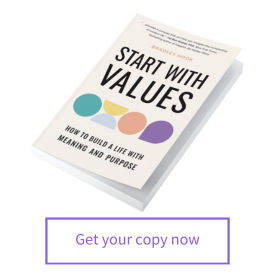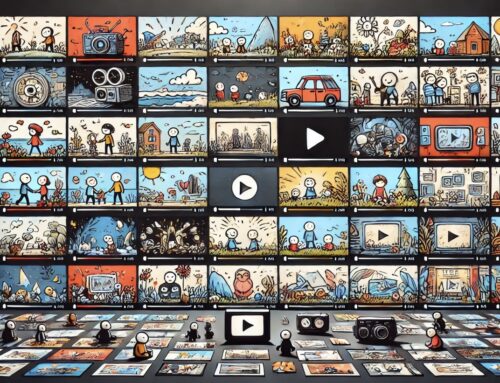We live in an age of instant answers. There is endless data (and constant distractions). Yet meaning? That remains elusive.
In our pursuit of success, we often bypass significance. But what gives life its depth isn’t just what we achieve—it’s the story we tell ourselves about the journey. The meaning hidden within.
This isn’t abstract philosophy. It’s grounded in science.
I love hearing people share their meaning-making process:
“I didn’t pass the exam, but it’s better because that gave me space to consider whether it was really the right direction.”
“The divorce gave me a fresh start.”
“The heart attack was necessary for me to change my ways.”
“The business failure meant that I could regain stability through a normal job.”
“The success I achieved didn’t make me happy, so I changed career.”
Each story reframes struggle. Each one reshapes pain into purpose. This is the heart of meaning.
What is meaning, really?
Meaning isn’t a luxury—it’s a psychological necessity. Psychologists define it as the sense that life has coherence, purpose, and significance. Neuroscientists have found that meaningful experiences activate reward and emotion centers in the brain. Meaning regulates our nervous system. It energizes us. It makes stress bearable.
More than happiness, meaning helps us endure life’s inevitable hardships.
Can we measure meaning?
Yes. Researchers like Michael Steger have created tools to measure meaning in life. These assessments look at three key components: coherence (does my life make sense?), purpose (am I pursuing goals that matter?), and significance (does my life feel valuable?).
People with a strong sense of meaning enjoy better health, deeper relationships, and longer lives. Meaning doesn’t just feel good—it does good.
In my research at Resilience Institute, we discovered that Fulfillment is the most important skill supporting the most resilient people. Fulfillment is the side effect of a life that is meaning-full. But it doesn’t happen by accident.

Where does meaning come from?
Meaning isn’t something we stumble upon like a lost object. It’s something we actively create.
There are three primary sources:
- Connection: Relationships, community, love, and service.
- Contribution: Using your strengths in service of something greater.
- Coherence: Making sense of your past, present, and future.
When our actions align with our values, we experience coherence. When we help others, we feel significant. When we love, we tap into something timeless.
Why does meaning matter now?
Because more of us are burned out, distracted, and overwhelmed. We’re told to hustle, optimize, and produce. But machines can do that.
What they can’t do is care.
The future will be automated—but meaning-making remains distinctly human.
In a world shaped by AI, our advantage is not speed or scale. It’s purpose.
Are we facing a crisis of meaning?
Yes—and it’s quietly spreading. Despite unprecedented access to information, entertainment, and comfort, many people report feeling empty, lost, or disconnected. Rates of anxiety, depression, and burnout are rising. This is not just a mental health issue—it’s a meaning issue. When life feels like a series of tasks instead of a coherent story, we lose our sense of direction. In a world obsessed with productivity, we’re starving for purpose.
Part of the problem lies in the hedonic treadmill—the tendency for us to quickly adapt to positive changes and return to a baseline level of satisfaction. We chase achievements, possessions, and experiences, only to find their joy fleeting. Without meaning, we become trapped in this loop, mistaking more for better. The crisis of meaning is not about the absence of success. It’s about the absence of why.
Previous generations had meaning prescribed by religion, survival, leaders, and philosophers. This made life less ambiguous. A quick glance at Instagram and influencer culture tells you that we’re desperate to find what matters to others, because it might help us.
How do we create meaning?
Start with values (see my latest book). Not vague inklings, but clearly articulated personal values. These are the compass points of a meaningful life. When we know what truly matters, we choose better, connect deeper, and lead with integrity.
Next, contribute. Do work that feels worthwhile. Help someone. Share your story. Humans are wired for contribution. It gives shape to both our suffering and our joy.
Then, reflect. Meaning grows in the pause. Take time to look back. Notice the patterns in your journey. See the thread that connects who you were with who you are becoming. This requires deliberately stopping and taking in the view of your life. The mountains climbed, the valleys traversed, the waiting spots when the weather turned, and the endless staircases that brought you here, now.
What gets in the way?
Busyness. Distraction. And the mistaken belief that meaning must be grand or heroic.
You don’t have to save the world. You just have to show up—with intention.
Meaning often hides in the small moments. A kind word. A deep breath. A quiet moment of awe.
We lose meaning when we silence our inner voice or outsource our values. Reclaiming it means listening deeply and acting with care.
Can science help us?
Absolutely. Neuroscience shows that meaningful experiences activate the brain’s default mode network, the region associated with self-reflection and imagination. They also light up the prefrontal cortex, which governs long-term thinking and decision-making.
Meaning helps regulate cortisol, enhances immune function, and builds emotional resilience.
Evidence-based tools like narrative therapy, mindfulness, and values-based coaching help people generate meaning—not just search for it.
What does a meaningful life look like?
It looks different for everyone. But it often includes:
- Living in alignment with personal values
- Regular moments of presence and gratitude
- Purpose-driven goals
- Emotional depth
- A sense of belonging
It may not always be glamorous. Often, it’s quiet. But it’s deeply alive.
What can I do today?
- Clarify your values. Use a values assessment or take time to journal.
- Connect with someone you care about. Be fully present.
- Make a small contribution. Any act of service matters.
- Reflect on your day. Ask yourself: What made today meaningful?
You don’t need to overhaul your life. Sometimes, a small realignment is enough.
Final thoughts
The science of meaning isn’t just academic—it’s practical, urgent, and profoundly human.
In a world obsessed with doing more, we must remember why we’re doing it at all.
Meaning is the story we tell ourselves about why our life matters.
Let’s make it a good one.
✨ Start With Values
Receive $400 of bonus resources with any order of my new book,Start With Values (Penguin Random House).
Written by : Brad Hook
Brad Hook is a writer, podcaster, speaker and entrepreneur. He helps individuals and teams achieve sustainable high performance through inspiring workshops and a powerful suite of digital tools. Discover his new book, Start With Values (Penguin Random House), — available now!
Stay connected with Brad
BE NOTIFIED ABOUT EVENTS and receive the latest tools and tips first
We will never share your email with others.







